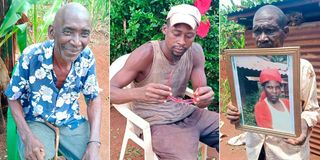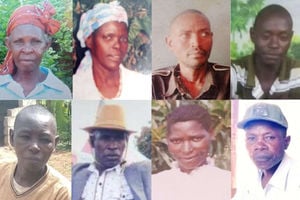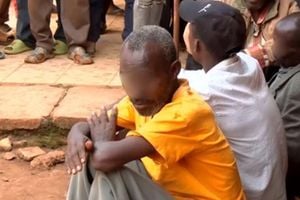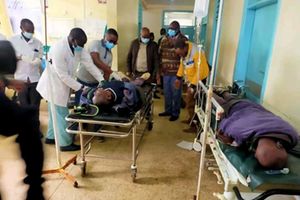
From left: Joseph Gichamba, Sammy Ngari Ndiga and Francis Njogu displaying a portrait of his late wife Alice Wanjiru.
“I will never drink alcohol again.”
These were the words of Mzee Joseph Gichamba, 72, who became blind after consuming a brew suspected to have been laced with poison at Kangai in Kirinyaga County that left 17 people dead.
The words were echoed by Sammy Ngari Nthiga, 35, who is now partially blind after the drinking spree.
Gichamba and Nthiga were among five people who lost their eyesight after taking the contaminated liquor at a bar. Six Kangai and Kandogu villagers died on February 5 while 11 others succumbed the following day.
The Nation.Africa visited the quiet villages in Mwea Constituency on Monday and caught up with survivors of the killer alcohol, relatives and friends of those who died who are still trying to come to terms with the happenings.
Nearly every home in a radius of 500 metres in Kangai which is connected with a tarmac road from Kutus and lies near Kimicha Trading Centre is dotted with fresh graves of men and women, old and young who succumbed to the brew.
Apart from the 15 who died at Kangai and two at Kandogu, villagers said they had ‘silently and secretly’ interred others who died after consuming suspected adulterated brews to avoid reprisal from the government.
Kangai is a lush green area criss-crossed by Karikine and Kathiga water furrows from Thiba River which has made farming lucrative with locals venturing into banana, French beans, maize, tomatoes, sweet potatoes, highland rice and sorghum as well as livestock keeping.
The events of that day which sent shockwaves across the country are still fresh in the minds of the residents.
We found Gichamba sitting alone under the shed in his banana farm as our guide, Mr Danson Ngari tried to crack jokes with him and introduce us.
“Mzee cannot see. Just shake his hand,” Ngari said as Gichamba raised his hands in the air to greet us.
Mr Gichamba said he is devastated after losing his sight and a female friend who died taking the brew at Carlifonia Bar which the residents later raided and burnt down after the deaths.
“I am grateful to God for sparing my life although I can no longer see,” Gichamba, who worked as a casual labourer said.
“I have now been rendered useless as I can’t fend for myself. My wife died nine years ago. The woman I was living with also died after imbibing the drink. I am now forced to depend on my son who does casual work for everything,” Gichamba said.
Mr Gichamba spoke of how he went to the bar with a female friend and started drinking together.
He later excused himself as he had unfinished work and left his lover Stella Muthoni in the bar.
When he arrived home, he sensed danger when he developed stomach pains and realised that he could not see properly.
"On arrival at home, I felt unwell and I was rushed to Kerugoya referral hospital and put on a drip. As I was being taken to the hospital I could see a little bit but by the time I was discharged I was totally blind," said Mr Gichamba.
Mr Gichamba said he panicked when he heard that some villagers who had been admitted in the same ward with him had passed away.
"When I was told that villagers who had taken the brew in the same bar had succumbed, I was worried and started praying to God and he heard my prayers. I thank God that though I can't see, I am alive," he said.
“On being discharged I was shocked to learn that my female friend whom I had left in the bar drinking had died," he said.
He is optimistic that he will fully recover and start living a normal life free of dependency once again.
Nthiga had joined his friends in the bar around 12.30 pm to quench his thirst.
"I wanted to take some drink so that I can go back to work, the drink normally gives me strength to work," he explained.
He ordered for his favourite brand of liquor and enjoyed it as he talked with his friends. After he had enough, he developed stomach pains and hurriedly left for home.
On arrival, he retired to bed and when he woke up in the morning, he discovered that he had a blurred vision.
His weak legs and general body weakness made it difficult for him to walk properly. This made him panic and asked one of his friends to take him to Kerugoya Hospital for treatment.
"My friend had a vehicle and when I explained to him how I was feeling, he agreed to take me to the hospital. On arrival at the hospital I was immediately put on drip because I was dehydrated since I was having running stomach. That is how I survived," said Mr Nthiga.
Mr Nthiga said he escaped death by the ‘Grace of God.’ " When I was in hospital, I learnt that some of my colleagues died. I thank God I'm alive," said Mr Nthiga.
Mr Nthiga used to enjoy drinking but he never sensed that one day, things will change for the worse. But the cheap alcoholic drink sold at the bar belonging to a local tycoon changed his life.
Nthiga is lucky to be alive as most of his friends passed away at their respective homes while others at the hospital.
He vividly remembered that on that fateful day, he had money and he wanted to enjoy himself like other revelers who were in the popular drinking joint.
"I sensed danger when I failed to see properly the following day," said Mr Nthiga. Mr Nthiga said the killer brew had ruined his life and vowed to quit drinking.
And Francis Njogu is a sad man. He has known no peace since the day his wife Alice Wanjiru departed. She was among the victims of the lethal drink.
"My wife arrived home at around 5pm and I noticed that she was drunk. I asked her why she was drunk and she responded that it was not bad. Suddenly she fell sick and took her to Kerugoya hospital where she passed on as she was undergoing treatment," recalled Mr Njogu, adding that it was first time his wife, a Catholic adherent, had taken alcohol.
After the death of his wife, Njogu has been facing a lot of problems as he has no one to cook food and wash clothes for him.
Mr Njogu said he stopped drinking seven years ago when he realised that the habit was wasting him away and retarding him in terms of development.
"Many things went wrong at home and I had to shun drinking. Brews are dangerous and the government should not relent in its war against them," he said.
For Mzee Joseph Ndama, 63, he is still trying to come to terms with the death of his wife, Josephine Wakuthii, 52.
He arrived home from Kangai market where he had gone to buy potatoes, only to find his wife drank and weak.
Mr Ndama was concerned about the condition of his wife and asked her how she was feeling.
"When I asked my wife what was her problem, she told me that she could not see properly and I sensed danger. She even refused to take supper which had been prepared by her daughter," said Mr Ndama. His efforts to convince his wife to seek medical attention bore no fruits.
“I wanted to take my wife to the hospital but she declined. She then went to sleep but at around 1 pm she asked me to give her some water and I did. She then told me that she was feeling cold and asked me to cover her with a blanket," said Mr Ndama.
However, in the morning Mr Ndama sensed something was amiss when his wife failed to wake up.
"It was then that I alerted family members and we reported the matter to the police and recorded statements. The body was later removed to the mortuary," said Mr Ndama.
A resident, Lucy Wanjiku complained that the brews were very retrogressive and their sale and consumption should be discouraged.
But for Danson Ngari, 47, he was lucky when he went to the bar he decided to ‘upgrade’ and take another expensive drink after seeing his friend in the premise.
“I am lucky I didn’t take the brew that was on promotion. I would have died. It is only our home that no one died in this village,” Mr Ngari said.
Mwea MP Mary Maingi vouched for licensing of bars to be reverted to the National Authority for the Campaign Against Alcohol and Drug Abuse (Nacada) to avoid conflict of interest at the county level.
Currently, bars are licensed by county governments.
“There’s a major conflict of interest. A governor might want to interfere with bars so that not to offend his or her electorates. All requirements that bars should not be near public institutions, schools, residential areas and churches should be adhered to,” Maingi said in an interview at her National Government Constituency Development office in Mwea.
Area MCA James Wambu admitted that the area harbours toxic brews.
"It is true in this village we have a lot of illegal brews whose sale shoul d be discouraged," said Mr Wambu.









